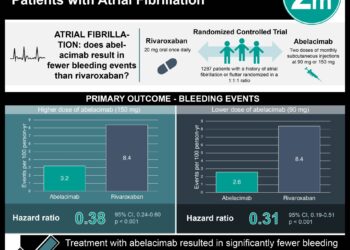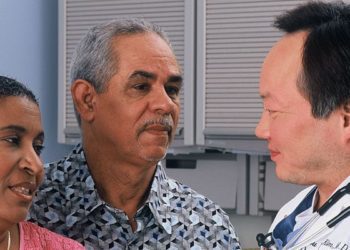Quick Take: Association of Rivaroxaban With Thromboembolic Events in Patients With Heart Failure, Coronary Disease, and Sinus Rhythm
Rivaroxaban is a selective direct factor Xa inhibitor that has been associated with improved outcomes in stable patients with chronic atherosclerotic cardiovascular disease and acute coronary syndrome. Nevertheless, its role in the treatment of patients with coronary artery disease (CAD) in addition to heart failure remains unclear. In the COMMANDER HF trial, rivaroxaban did not significantly reduce the risk of all-cause mortality, myocardial infarction, or stroke in patients with CAD and normal sinus rhythm after a hospitalization for worsening heart failure (HF). However, thromboembolic events were not studied as a primary outcome. In this secondary post-hoc analysis of the COMMANDER HF randomized controlled trial, 5,022 patients with CAD who had been recently discharged after treatment for worsening heart HF with reduced ejection fraction and sinus rhythm were assigned to receive daily rivaroxaban (5 mg) or placebo in addition to standard antiplatelet therapy to assess the impact on thromboembolic events. At baseline, 77.1% of the patients were men, 82.2% were white, and the mean (SD) age was 66.4 (10.2) years. Antiplatelet agents were prescribed in nearly all patients, with the majority receiving aspirin (93.1%), followed by thienopyridines (40.1%) and dual antiplatelet therapy (34.8%). Researchers found that fewer patients in the rivaroxaban group (13.1%) had a thromboembolic event including sudden/unwitnessed deaths as compared to those in the placebo group (15.5%) over a median follow-up of 19.6 (11.7 to 30.8) months (HR 0.83, 95% CI 0.72 to 0.96, p=0.01). The results were similar when sudden/unwitnessed deaths were excluded (6.1% vs. 7.6%, respectively, HR 0.80, 95% CI 0.64 to 0.98, p=0.04). Overall, results from this study suggest that adding low-dose rivaroxaban to standard antiplatelet therapy in patients with CAD and sinus rhythm after a heart failure exacerbation may reduce the risk of thromboembolic events. Importantly, as the primary outcome in this post-hoc analysis was not defined in the original study protocol, these results will require confirmation in future prospective clinical trials.
Click to read the study in JAMA Cardiology
Image: PD
©2019 2 Minute Medicine, Inc. All rights reserved. No works may be reproduced without expressed written consent from 2 Minute Medicine, Inc. Inquire about licensing here. No article should be construed as medical advice and is not intended as such by the authors or by 2 Minute Medicine, Inc.







